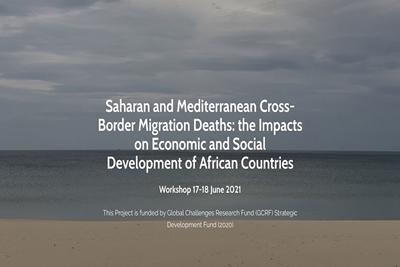Workshop on Irregularised Migration, Deaths and Missing Migrants

On 17 and 18 June, the Faculty of Social Sciences hosted an international and interdisciplinary workshop on the subject of irregularised migration, deaths and missing migrants, looking into the effects on the economic and social development of African countries.
With the title ‘Saharan and Mediterranean Cross-Border Migration Deaths: The Impacts on Economic and Social Development of African Countries’, this workshop focused on irregular migration to Europe from African countries and the ensuing deaths and missing persons. Irregularised sub-Saharan migrants usually travel to Libya, Morocco, Algeria or Tunisia before they embark on the dangerous journey to Europe across the Mediterranean Sea onboard dinghies and unseaworthy boats. The journeys across the Sahara Desert are also notoriously treacherous, involving significant risks, and resulting in many unreported deaths and missing migrants.
The workshop was the key event of a year-long project funded by the Global Challenges Research Fund (GCRF) Strategic Development Fund (SDF). Led by Dr Remigius N Nwabueze in the School of Law. The project’s multidisciplinary team comprised of colleagues from across the University of Southampton, and partner institutions in Ghana (Department of Geography and Resource Development, University of Ghana, and the Institute of Statistical, Social and Economic Research, College of Humanities, University of Ghana), Nigeria (Faculty of Law, University of Nigeria) and Greece (Greek National Commission for Human Rights).
The workshop brought together academics and practitioners working on this topic, including colleagues from the International Committee of the Red Cross, Missing Persons Project; the International Organization for Migration, Missing Migrants Project; a former Immigration Judge of the Upper Tribunal (Immigration and Asylum Chamber) UK; a former Adviser to the Children’s Commissioner England; and fellow academics from a number institutions, including: the Department of Anthropological Studies, University of Malta; the African Centre for Migration and Society, University of Witwatersrand, Johannesburg, South Africa; the Department of Social and Policy Sciences, University of Bath, UK; the Department of Anthropology, Columbia University, USA; the Centre for European and International Legal Affairs, Queen Mary University of London, UK; the School for Policy Studies, University of Bristol, UK; and the German Centre for Integration and Migration Consensus & Conflict, Dezim Institut, Germany.
The diverse and enriching range of contributions through presentations and vibrant discussions highlighted the painful realities of these life-threatening journeys and the devastating consequences of missing migrants, or their deaths, for their loved ones left behind, and the communities of origin more broadly. In the course of 4 sessions, the presentations and debates included considerations of the multiplicity of factors that influence migration decision-making, and the effect of increasing restrictive migratory policies, securitisation and externalisation of border controls, leading to irregularisation of migration. Participants’ contributions also covered legal considerations regarding the right to identification in the context of international humanitarian law and international human rights law; problems of investigation and reporting of deaths and missing migrants; issues regarding disposal procedures to enable identification; and repatriation of bodies. They further scrutinised the impact of deaths and missing migrants on the families and communities of origin and pointed towards possible future research avenues and solutions. They also elaborated on enforceable principles and duties in relation to management of bodies and their burials; and possible paths towards respectful and dignified identification processes and the assistance to families affected.
These discussions enabled participants to emphasise a number of critical aspects including the notion of missing migrants and the central role families of missing migrants have in the search mechanisms and the identification processes. This workshop provided an opportunity to establish a research agenda based on priorities of communities and countries of origin for future empirical and interdisciplinary research with the purpose of contributing to proposals and solutions centred in the countries of origin.
Dr Ainhoa Campàs Velasco, School of Law, Research Fellow on the project.
More information about the project is available at:
https://saharanandmediterraneanmigration.wordpress.com/about-the-project/